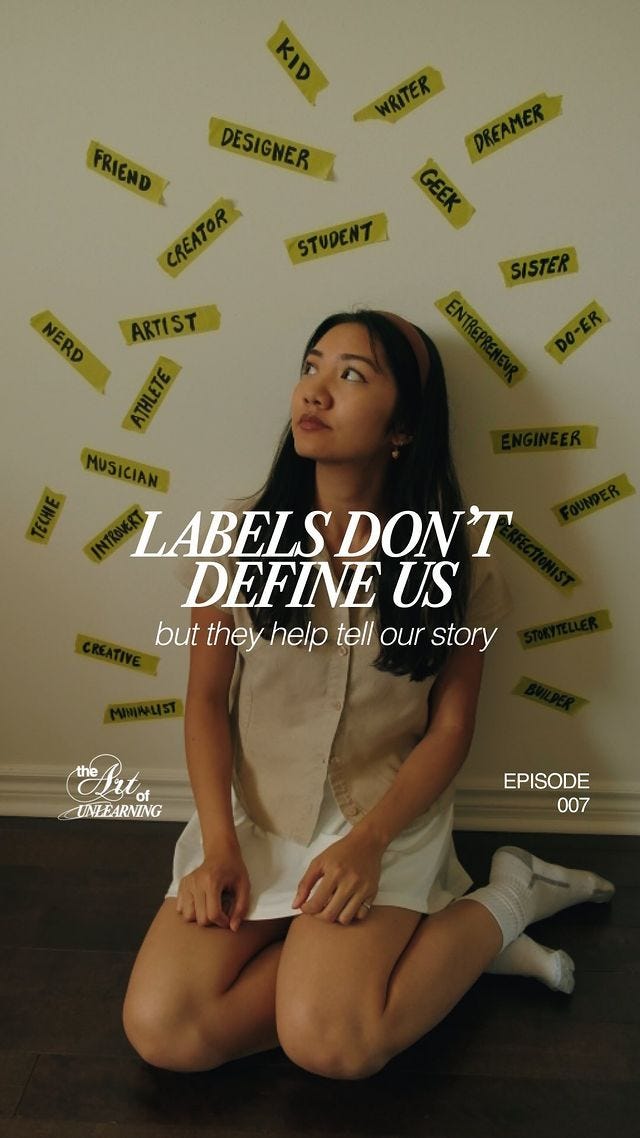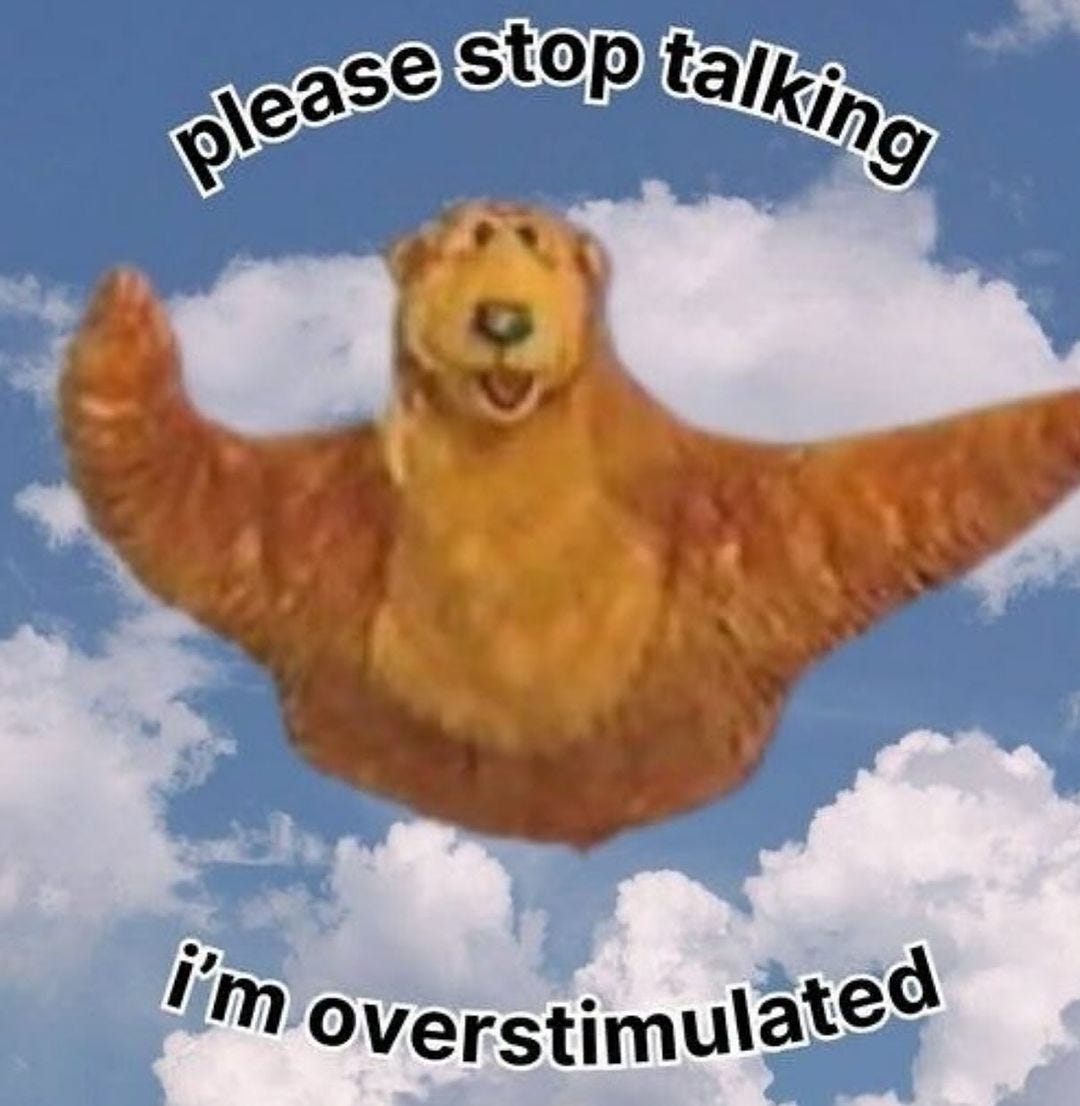High-Functioning or High Expectations? Rethinking Autism Labels
Introducing, The Autism Labelling Paradox
Hello Hi and Welcome to the +663 of you that have subscribed to the newsletter since it resumed at the start of sept. Ive been meaning to say iya every week but felt a bit shy like you’re here for the work not for me lol. But I've enjoyed chatting with you in the comments and seeing all the restacks, etc. I've held back from sharing my POV online for most of this year, so to have come back and for it to be so well received makes me happy ngl. I have the big scary goal of 5,000 readers by the end of the year so please do keep sharing the newsletter with friends, posting it in autism support groups and using it as a tool to help people understand your world more. Autism is presented as this black-and-white thing, and it's kind of ironic that it’s really not, so for as long as you’ll listen… well read, I’ll keep writing about the nuances of our experience.
Wait, you can listen though. I do have a podcast. It's more practical tips and tools with the occasional yap. Here are a few of the episodes so far…
Im still working on the format and stuff a head of its hard launch and rebrand so have a listen and drop a comment, let me know what you think, what you loved and maybe didn’t like.
High-Functioning or High Expectations? Rethinking Autism Labels
I went through a phase in the spring where I was running a lot and posting about it on Instagram (insufferable, I know), but because of that, people started to ask me about running, and I was even asked to jump on a running project at work. There was a problem though: I don’t identify as a ‘runner’, and my Strava would agree — I was a passionate jogger at best. In a label-obsessed world, I can understand why people wanted to box me into being that kind of person, and I guess the PSRC hoodies didn’t help.
Since my joints started acting up, I’ve not been able to run regularly, but that makes me wonder: In their eyes, am I still a runner? Just because I can’t run right now, does that invalidate everything I’ve done before or may do in the future?
Introducing the Autism Labelling Paradox
Some of us spend years in search of the label that fits us best, and when we finally land on autism, things make sense — our life has context, and we can start to learn more about ourselves. But once you get deeper into the messy world of neurodiversity, you begin to realize that there are more labels (each with their own problems). It’s simply not enough to just say you’re autistic; you’ve got to break it down even further...
High Functioning, Low Functioning, Level 1, 2, or 3, Non-speaking, Sensory Sensitive ect.
All make it sound like there are autism sub-types, and that once you get to the root of which kind of autistic you are, you’ll be on the path to enlightenment. But in a society that demands neat labels, these all overlook one thing: presentations of autism are fluid. And this is the Autism Labelling Paradox — labels validate but also restrict autistic expression.
We’re so obsessed with labels.
The chronically online among us will have noticed that the need to label everything a “core” has died down over the last 6-9 months. I think the forced mob wife trend was the final nail in the coffin. But it was a wild four years. What we once tried to call subcultures are now more accurately referred to as ‘micro-labels’. But why, and what was their impact?
While micro-labels can be good for discovering new forms of self-expression, their overall effect dampens culture in the algorithmic era. Labels should help us figure out who we are, but not define who we are, and yet that line is growing blurrier by the day. - The Etymology Nerd
Both IRL and URL, we use labels to find and form common ground. They offer a sense of comfort and create a place to belong, but when it comes to autism and its micro-labels, it’s not that simple.
Autism Spectrum Disorder (ASD): The current umbrella diagnosis that encompasses various levels of autism-related traits. It replaced older categories like Asperger’s syndrome and PDD-NOS (Pervasive Developmental Disorder - Not Otherwise Specified) in the DSM. Levels 1, 2, and 3 are then used to indicate the severity of autism, with Level 1 being the least support-needed (formerly referred to as "high-functioning"), and Level 3 requiring the most significant support (formerly associated with "severe autism").
Sounds simple, but the level of support autistic people need isn’t fixed. In fact, it’s often dependent on the inflexibility of the world around us.
The Diversity of Autism
Autism is a spectrum condition that manifests differently from person to person and can also change over time. The fluidity of autism can be seen as we move through different environments or even as we go about our day.
So, when it comes to labels like ‘high support needs’ or ‘high functioning,’ it’s important to first think about what that means. The vagueness of the label leaves room for interpretation that frames autism as a problem, and these labels subcategorize autistic people based on how much of a ‘problem’ we are or how well we can fit into this structured world.
But any autistic person will be able to tell you of a time they’ve, ‘out of nowhere,’ been unable to do something they used to do with ease, or how autistic burnout leaves them unable to stick to the routines they’ve created to deal with adulting — and the internalized ableism they have to reckon with. Oops, maybe I’m projecting, but when I end the day unable to hear another sound or think a coherent thought without literally crying, that label of ‘high functioning’ feels very much not true.
The Costs of Flattening Autism
Like most other areas of culture, the West seeks to limit autism to these neat presentations, flattening autism into something that can be easily understood, campaigned for, and commodified.
But with this comes harmful stereotypes, another standard/expectation for autistic people to try to meet or challenge, and possibly the worst outcome — our own version of diaspora wars.
The Path Forward
Autism isn’t a social construct. It’s a biological fact — a natural variation in the human brain that exists whether we label it or not.
Anyone who is late-diagnosed will tell you that their autism didn’t begin the day they were diagnosed. It doesn’t exist because it’s defined. Autism is a fundamental aspect of a person’s experience and being, not something society creates or can erase through social norms. This means that even when we get to the point of inclusion and ‘autism as the norm’ (whatever that means), autistic people will still be autistic.
In that autopia (autism utopia), labels would be used to validate people's experiences, a shortcut to communicating needs, and a factor in accessing support. All things we could use them for today. But we wouldn’t use them to define a person’s experience or flatten their identity. Rather than relying on oversimplified categories, we’d embrace the complexity of autism with nuanced conversations that respect both the individual and community’s fluid nature.
How do you feel about the balance between self-identification and the need for societal labels?








Labels have always been something I seek out to understand myself better and find validation for what I’m feeling. Going from suspecting autism to be pretty darn sure has been a godsend, because for whatever reason (let’s be real, the people pleasing reason) I felt immense shame whenever I felt my autistic reactions to certain things, and instead of communicating my needs, I tried to squash them. Now instead of thinking “I hate when people touch me, but I just need to get over it,” I think “I am touch averse because my brain is literally wired different,” which has given me permission to communicate I don’t want to be touched.
Onto the high and low functioning labels: I really like how you discussed this. If I’d had an official diagnosis, I’d probably be considered “high functioning,” but only in the public eye. I would frequently have what I now recognize as meltdowns when the expectations of basic life became too high for me to conquer, such as not being able to find parking when already running late, or if a plan changed last minute. Academically I thrived, but I also had a specific bathroom stall at my college where I would go to curl up in the corner and cry when I got overstimulated or even slightly embarrassed (aka felt I failed at being normal).
I feel like neurotypical folks/general society created these labels without understanding the ups and downs even the most “high functioning” autistic people may experience. Some days are good, some days I can’t take care of myself. I rely heavily on frozen chicken nuggets and meal prepping for such occasions, and it took me years of therapy to be able to not dissociate while driving. I long for that autopia where there is no shame surrounding various levels of function and the focus is on getting needs met rather than how well we can blend into neurotypical society.
Thank you so much for your writing ❤️ sorry for the essay lol, I’m all or nothing.
I don’t see any point in trying to change what labels people do or don’t identify with, but I personally have no issue being described as having low support needs and don’t think it flattens my identity as an Autistic person. I spend a lot of time working with Autistic people typically described as high needs, and feel this has really given me a sense of solidarity with my wider Autistic community; despite my chattiness, I’ll often have more in common with a nonverbal Autistic child described as high support needs than any of the neurotypical people at work, so in that sense, I definitely agree that us Autistic folk have more in common across different support needs than we do separating us. At the same time, even though I struggle with a lot of things, I simply don’t need the level of full-time care needed to give high support needs Autistic people the best life possible, and have a lot of privileges they don’t. I don’t see it as being about dividing or flattening our identities so much as recognising that, even within the same community, we have differing access needs to help us all thrive and differing levels of privilege. Sorry for the long comment, I find this such an interesting topic and one you’ve talked about with a lot of nuance here is all so I wanted to reply with that same level!